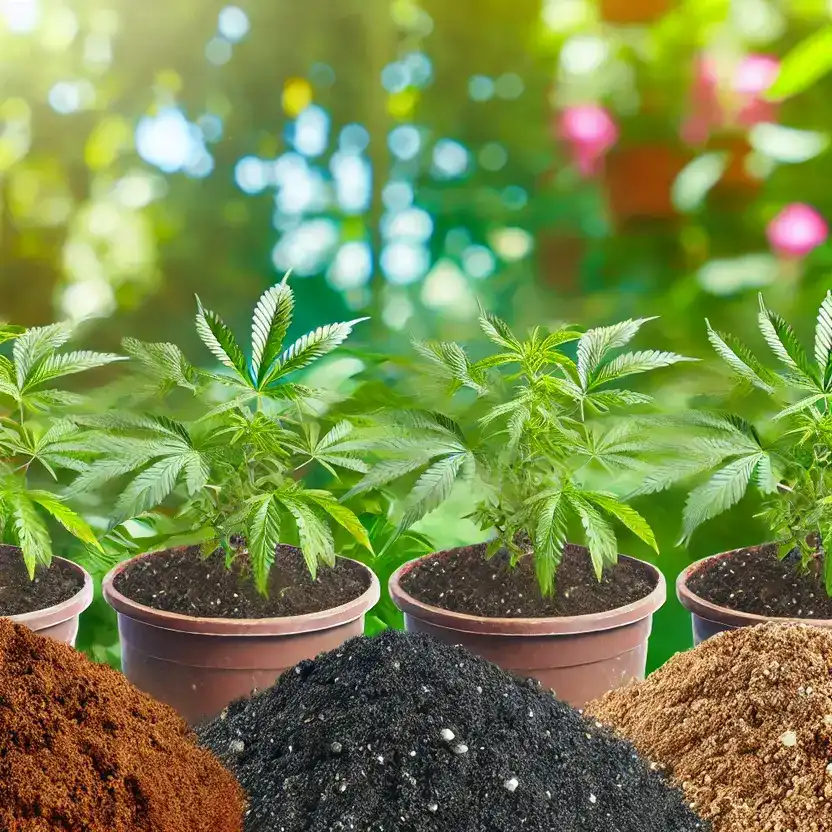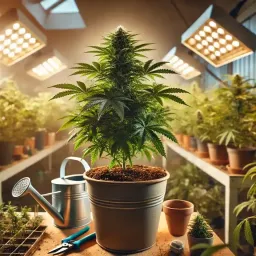Choosing Soil for Cannabis Growth
Understanding the Importance of Soil in Cannabis Cultivation
Why Soil Quality Matters for Cannabis Plants
The quality of soil is crucial for healthy cannabis plants. Good soil provides the necessary nutrients, moisture, and support that plants need to thrive. When the soil is rich and well-balanced, it can significantly enhance the growth rate and overall yield of your cannabis crop.
Effects of Soil Composition on Growth and Yield
Soil composition greatly affects how cannabis plants grow. Different components, like sand, silt, and clay, influence how well the soil retains water and nutrients. If the composition is off, it can lead to poor growth, lower yields, and even plant stress.
How Soil pH Influences Nutrient Absorption
The pH level of your soil is another vital factor. Cannabis plants absorb nutrients best when the soil pH is between 6.0 and 7.0. If the pH is too high or too low, the plant may struggle to take in essential nutrients, leading to deficiencies and poor health.
Key Factors to Consider When Selecting Soil for Cannabis
Identifying the Right Texture for Healthy Roots
The texture of the soil plays a significant role in root health. Healthy roots need a balance of firmness and softness to grow properly. When selecting soil, ensure it has a texture that allows roots to spread easily while providing adequate support.
Importance of Drainage and Aeration
Good drainage and aeration are essential for cannabis plants. Soil that drains well prevents water from pooling, which can lead to root rot. Adequate aeration allows oxygen to reach the roots, promoting strong growth and overall plant health.
Choosing Between Soil Types: Loamy, Sandy, and Clay
There are three main types of soil: loamy, sandy, and clay. Loamy soil is often the best choice for cannabis because it retains moisture while still draining well. Sandy soil drains quickly, which can be great for some plants, but may require more frequent watering. Clay soil, on the other hand, tends to hold too much water and may not be ideal for cannabis cultivation.
Nutrient Requirements for Cannabis Plants
Cannabis plants have specific nutrient needs that must be met for optimal growth. These nutrients are divided into macronutrients and micronutrients. Understanding what your plants require can help you choose the right soil and amendments to support their needs.
Understanding Macronutrients and Micronutrients
Macronutrients include nitrogen, phosphorus, and potassium, which are vital for plant growth. Micronutrients, like iron and magnesium, are also important but needed in smaller amounts. A balanced supply of both types of nutrients ensures your cannabis plants grow healthy and strong.
How to Assess Nutrient Content in Soil
To ensure your soil has the right nutrients, you can perform a soil test. This test will provide information about the nutrient levels and pH of your soil. By understanding the nutrient content, you can amend your soil accordingly to meet the needs of your cannabis plants.
Organic vs. Synthetic Soil Mixes
Evaluating Organic Soil Options for Cannabis Cultivation
When it comes to soil, you can choose between organic and synthetic mixes. Organic soil is made from natural materials and often improves soil health over time. This type of soil can support beneficial microorganisms that help your cannabis plants thrive.
Benefits of Using Organic Materials
Organic materials not only provide essential nutrients but also enhance soil structure. They improve water retention and aeration, which is crucial for healthy root development. Plus, using organic soil can lead to more flavorful and potent cannabis!
Common Organic Soil Mixes Recommended for Cannabis
- Coco coir: Excellent for water retention and aeration.
- Compost: Rich in nutrients and beneficial microorganisms.
- Worm castings: A nutrient powerhouse that improves soil health.
Understanding Synthetic Soil Mixes and Their Impacts
Synthetic soil mixes are designed to provide specific nutrients in a controlled way. While they can offer quick results, they may lack the beneficial microorganisms found in organic mixes. It's essential to weigh the pros and cons before deciding which is best for your cannabis plants.
Pros and Cons of Synthetic Options
- Pros: Fast nutrient delivery and easier to control.
- Cons: May lead to nutrient lockout and can harm soil health over time.
How to Choose Quality Synthetic Soil Products
If you opt for synthetic soil, look for high-quality products that are specifically formulated for cannabis. Ensure they provide a balanced nutrient profile and are free from harmful chemicals. Reading reviews and checking for certifications can also help you make an informed choice.
Customizing Your Soil Mix for Optimal Results
Creating a Tailored Soil Blend
Customizing your soil mix can lead to the best results for your cannabis plants. By blending different soil types and amendments, you can create a mix that caters to your plants' specific needs. This tailored approach can enhance growth and maximize yield!
Key Ingredients for Cannabis-Friendly Soil Mixes
- Peat moss: Retains moisture and provides a good texture.
- Perlite: Improves aeration and drainage.
- Organic compost: Supplies essential nutrients and microorganisms.
How to Adjust Soil Composition Based on Growth Stage
Different growth stages require different soil compositions. Seedlings thrive in lighter, well-aerated mixes, while flowering plants may need a richer, more nutrient-dense blend. Adjusting your soil mix as your plants grow can lead to healthier plants and better yields.
Dive into our article on Understand cannabis growing tips beginners for a complete overview. We cover all the essential points and provide a lot of useful information.
Quick Summary
Here's a brief recap of the key points discussed so far:
- The quality and composition of soil are vital for healthy cannabis growth.
- Soil pH levels significantly influence nutrient absorption for cannabis plants.
- Choosing the right soil type and texture can enhance root health and overall yield.
- Regular soil testing and amendments are essential to meet the specific nutrient needs of cannabis.
Testing and Amending Soil for Cannabis Growth
How to Perform Soil Tests for Cannabis Cultivation
Testing your soil is a crucial step in ensuring that your cannabis plants thrive. It helps you understand the nutrient levels and soil pH, which are essential for healthy growth. You can perform soil tests at home with a few simple tools or send samples to a laboratory for more detailed analysis.
Essential Tools for Soil Testing
Before getting started, gather the following tools for effective soil testing:
- Soil Testing Kit: These kits come with everything you need to measure pH and nutrient levels.
- Garden Trowel: Useful for collecting soil samples from different areas of your garden.
- Mixing Container: Use this to combine soil samples before testing.
Interpreting Soil Test Results Effectively
Once you have your soil test results, it’s time to make sense of them! A good soil test report will include information on pH, nitrogen, phosphorus, potassium, and other essential nutrients. Focus on maintaining a pH between 6.0 and 7.0 for optimal cannabis growth.
Amending Soil to Meet Cannabis Needs
After testing your soil, you may need to amend it to ensure it meets the specific needs of your cannabis plants. Amending soil is an important step for enhancing nutrient content and making your soil more suitable for growth. Let’s explore some common soil amendments that can boost your soil's performance!
Read our full article on All about unique cannabis strains to get a thorough understanding. We cover all the bases and offer practical advice and tips.
Common Soil Amendments for Nutrient Enhancement
Here are a few popular amendments to consider:
Read our full article on Comprehensive guide to cbd chronic pain management to get a thorough understanding. We cover all the bases and offer practical advice and tips.
- Compost: Adds organic matter and improves soil structure.
- Worm Castings: Provides a rich source of nutrients and beneficial microorganisms.
- Bone Meal: Great for increasing phosphorus levels, which aids root development.
- Fish Emulsion: A fast-acting fertilizer that’s high in nitrogen.
Adjusting Soil pH Levels for Cannabis Health
Maintaining the right soil pH is essential for nutrient availability. If your soil is too acidic (< 6.0) or too alkaline (> 7.0), your cannabis plants may not absorb nutrients properly. You can raise pH by adding lime or lower it by applying sulfur.
Best Practices for Soil Maintenance During the Cannabis Growth Cycle
Monitoring Soil Health Throughout the Growth Stages
Regularly checking your soil health is vital as your cannabis plants mature. Different growth stages have different nutrient requirements, and monitoring helps you meet those needs effectively. Keep an eye out for any nutrient deficiencies that might appear as yellowing leaves or stunted growth.
Signs of Nutrient Deficiencies in Cannabis Plants
Recognizing the signs of nutrient deficiencies can save your crop! Here are some common symptoms to watch for:
Take a deep dive into our article on Insights into cannabis microdosing techniques. This comprehensive guide will provide you with all the information you need to understand this subject better.
- Yellowing Leaves: May indicate nitrogen deficiency.
- Purple Stems: Often a sign of phosphorus deficiency.
- Curling Leaves: Can point to potassium deficiency.
Routine Soil Maintenance Tips for Optimal Growth
Maintaining your soil is an ongoing process. Here are some tips to keep your soil healthy:
- Regular Testing: Test your soil at least once a season.
- Water Wisely: Avoid overwatering, which can lead to root rot.
- Organic Matter: Continuously add compost or organic materials to enrich the soil.
Utilizing Cover Crops and Mulching Techniques
Using cover crops and mulching can significantly improve your soil quality. Cover crops help prevent soil erosion, enhance nutrient content, and suppress weeds. Mulching retains moisture and regulates soil temperature, providing an ideal environment for cannabis growth!
Benefits of Cover Cropping for Soil Health
Cover cropping offers several advantages:
- Improved Soil Structure: Helps aerate the soil and improves drainage.
- Nutrient Fixation: Some cover crops can fix nitrogen, enriching the soil.
- Weed Suppression: Reduces competition from unwanted plants.
Effective Mulching Strategies for Cannabis Gardens
To get the most out of mulching, consider these strategies:
- Organic Mulches: Use straw, wood chips, or grass clippings to break down over time.
- Layering: Apply a thick layer (3-4 inches) to effectively suppress weeds and retain moisture.
- Seasonal Changes: Refresh your mulch each season to maintain its effectiveness.
Recap of Key Points
Here is a quick recap of the important points discussed in the article:
- Soil quality is essential for healthy cannabis growth, affecting nutrient absorption and overall yield.
- Soil composition, texture, and pH level significantly influence cannabis plant health and nutrient availability.
- Choosing between organic and synthetic soil mixes can impact plant growth, with organic options often being more beneficial long-term.
- Regular soil testing and timely amendments are crucial for meeting the specific nutrient needs of cannabis plants.
- Monitoring soil health throughout the growth cycle helps identify nutrient deficiencies early and allows for corrective actions.
Practical Tips for Soil Management
- Test soil at least once a season to assess nutrient levels and pH.
- Maintain a soil pH between 6.0 and 7.0 for optimal nutrient absorption.
- Use organic amendments like compost and worm castings to enrich soil quality.
- Implement mulching and cover cropping strategies to improve soil health and moisture retention.
- Adjust soil composition according to the growth stage of cannabis plants for better results.
FAQs
- Why is soil quality important for cannabis cultivation? Soil quality is vital as it provides essential nutrients, moisture, and support for healthy growth. Well-balanced soil enhances growth rates and overall yield.
- What pH level is ideal for cannabis soil? The ideal pH level for cannabis soil is between 6.0 and 7.0, which allows for optimal nutrient absorption.
- What are the different types of soil suitable for cannabis? The three main soil types are loamy, sandy, and clay. Loamy soil is preferred as it retains moisture while draining well.
- What nutrients do cannabis plants require? Cannabis plants require macronutrients (nitrogen, phosphorus, potassium) and micronutrients (iron, magnesium) for optimal growth.
- How can I improve my soil for cannabis growth? You can improve your soil by testing nutrient levels, amending with compost or worm castings, and maintaining proper pH levels.
Latest Posts
Strains
Health Benefits
Consumption
Consumption






